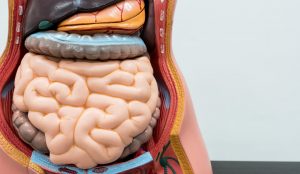Ulcerative colitis is one of the most unpleasant and debilitating digestive illnesses and effects around 146,000 people in the UK. It is also sometimes known as inflammatory bowel disease (IBD), which can also describe Crohn’s disease. This long-term condition has a serious impact on a person’s ability to digest food and can cause significant pain. To give a clearer picture if you or someone you know may be suffering from this condition here are its causes and effects.
What Causes Ulcerative Colitis?
 The cause of ulcerative colitis has not been definitively discovered but the dominant professional consensus is that it is an autoimmune disease. This means that it’s a result of the immune system malfunctioning and attacking healthy tissue, which in this case is harmless bacteria located in the colon. The result of this is the tissue in the colon becomes inflamed due to the attack, which can worsen into ulcers and bleeding.
The cause of ulcerative colitis has not been definitively discovered but the dominant professional consensus is that it is an autoimmune disease. This means that it’s a result of the immune system malfunctioning and attacking healthy tissue, which in this case is harmless bacteria located in the colon. The result of this is the tissue in the colon becomes inflamed due to the attack, which can worsen into ulcers and bleeding.
The reason for this immune system malfunction is unknown but it’s thought to be down to a combination of genetic and environmental factors. Additionally, although anyone can get it, some demographics are statistically more likely to develop it. These include:
- Those aged 15-25
- Black people
- White Europeans, particularly those descended from Ashkenazic Jews
The Effects of Ulcerative Colitis
The predominant effects of the condition involve: diarrhoea that can contain blood, mucus or pus and will reoccur often, severe abdominal pain, needing to use the toilet frequently. These effects can have side effects of themselves that can include loss of appetite and significant weight loss. The severity of these effects can vary as it’s correlated to the amount of inflammation.
What is significant, however, is that these symptoms are not constant as they typically occur as flare-ups. Each individual with ulcerative colitis will have these flare ups at different frequencies and some may even go into a remission period with none at all. Furthermore, other effects on the body can occur during these flare-ups, such as:
- Swollen joints resembling arthritis
- Ulcers in the mouth
- Swollen, painful and red skin
- Irritation and redness in the eyes.
For severe cases of the illness – defined as defecating six or more times a day – other symptoms can arise such as: shortness of breath, fever, fast and irregular pulse and blood becoming more prominent in your stool.
Living with and Treating the Condition
 As there is no cure, for someone who lives with ulcerative colitis treatment can be a difficult thing. Typically, medication is used to reduce the severity of symptoms during a flare-up and return a person to a state of remission. The medications that may be used are; corticosteroids, immunosuppressants and aminosalicylates (ASAs). For most flare-ups these medications can be taken at home, but if the situation is more severe a hospital visit may be necessary and a doctor must use a stronger dose.
As there is no cure, for someone who lives with ulcerative colitis treatment can be a difficult thing. Typically, medication is used to reduce the severity of symptoms during a flare-up and return a person to a state of remission. The medications that may be used are; corticosteroids, immunosuppressants and aminosalicylates (ASAs). For most flare-ups these medications can be taken at home, but if the situation is more severe a hospital visit may be necessary and a doctor must use a stronger dose.
In addition to medication many people try to make lifestyle changes such as a change in diet or reducing stress levels through various methods. However, identifying specific lifestyle triggers is difficult, making the success very sporadic due the trial and error approach.
In the most serious cases where none of these methods work a surgical procedure known as an ileostomy may be necessary. This involves the small intestine being diverted out of an opening in the abdomen or altered into a pouch connected to the anus, this is called an ileo-anal pouch.
If you feel you may have ulcerative colitis symptoms you should consult your doctor immediately so they can prescribe the best course of action.